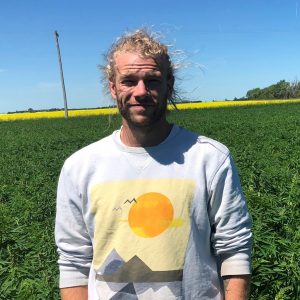
Sasha Loewen is a PhD candidate at Montana State University where he plans to graduate with a focus on organic and precision agriculture in 2022. Sasha grew up on a conventional grain farm in southeastern Manitoba, graduated from the University of Manitoba with a masters degree in molecular genetics in 2016, then switched his focus back to agriculture by helping transition the family farm to organic production in 2017. Thereafter Sasha began working in organic grain research and eventually found his way to working under the tutelage of Dr. Bruce Maxwell at Montana State University where he was awarded a graduate fellowship from Western Sustainable Agriculture Research and Education to pursue research in the applications of precision agricultural tools in organic grain systems.
In a time of increasing ecological awareness, organic agriculture offers sustainable solutions to many of the polluting aspects of conventional agriculture. However, without synthetic inputs, organic agriculture faces unique challenges such as weed control and fertility management. Precision Agriculture (PA) has been used to successfully increase input use efficiency in conventional systems and now offers itself as a potential tool for organic farmers as well. PA enables on farm experimentation (OFE) to systematically generate an understanding of crop response to varied inputs. Applied in an organic setting, we explored the effect of varied seeding rates of both cover and cash crops on harvested crop yield and quality using OFE; by annually repeating experimental input rates on fields, the seeding rates were optimized spatially and temporally for maximized farmer net return. Full field experiments have been carried out across five farms in the Northern Great Plains of both Canada and the USA. Machine learning using random forest algorithms were used to construct predictive models that included input crop seeding rates, yield and protein responses from combine mounted sensors, satellite information such as NDVI from previous growing seasons, topographic variables, and growing degree days. Through this method model simulations revealed that optimized variable seeding rates contributed to weed management, and maximized whole-field net returns. The project aims to move forward with an open-source decision support tool that will enable farmers to practice OFE with greater ease, thus encouraging adoption of both precision technologies and agroecological farming principles.